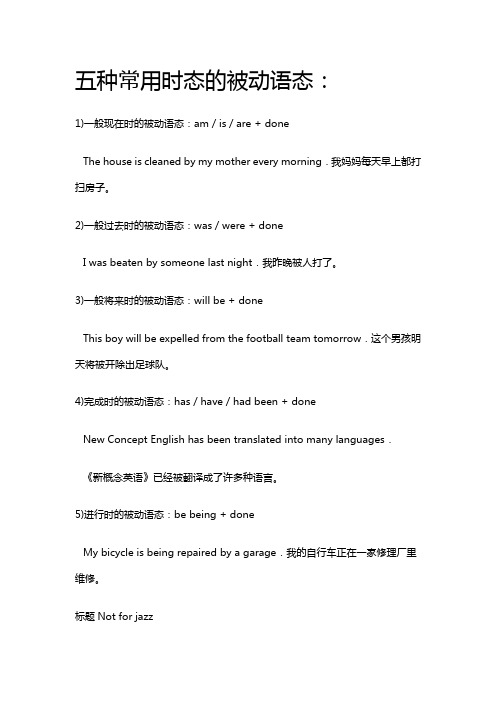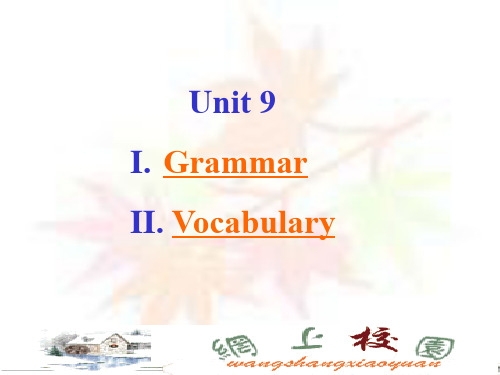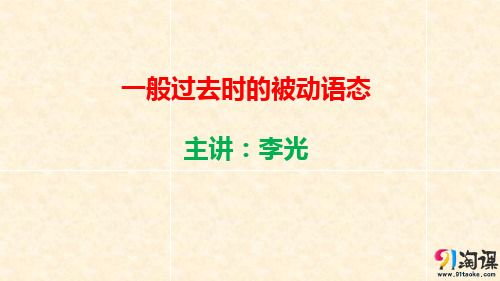一般过去时的被动语态
被动语态的三种形式

《有趣的被动语态三种形式》小朋友们,今天咱们来学学被动语态的三种形式,可好玩啦!第一种形式是“一般现在时的被动语态”。
比如说,“The book is read by me.(这本书被我读。
)” 就是说这本书不是自己主动被读的,而是被我读的。
第二种形式是“一般过去时的被动语态”。
像“The cake was eaten by him.(蛋糕被他吃了。
)” 这就表示蛋糕在过去的某个时候被他吃掉啦。
第三种形式是“一般将来时的被动语态”。
比如说“The game will be played by us.(这个游戏将被我们玩。
)” 意思是这个游戏在将来会被我们玩。
就像有一次,我和小伙伴玩游戏,我说“ The toy was broken by him.(玩具被他弄坏了。
)” 小伙伴一下子就明白啦。
小朋友们,是不是有点明白啦?《讲讲被动语态的三种形式》小朋友们,咱们来讲讲被动语态的三种形式哟!先来说说“一般现在时的被动语态”。
比如说“ The door is opened.(门被打开了。
)” 不是门自己打开的,是有人把它打开的。
然后是“一般过去时的被动语态”。
像“ The letter was written.(信被写了。
)” 这表示信在过去被写好啦。
最后是“一般将来时的被动语态”。
比如说“ The party will be held.(聚会将被举办。
)” 就是说聚会在将来会被举办。
比如说,学校里要举办活动,老师说“ The show will be prepared by you.(表演将由你们准备。
)” 小朋友们就知道要准备表演啦。
小朋友们,能记住这三种形式吗?《说说被动语态的三种形式》小朋友们,今天来说说被动语态的三种形式。
第一种,“一般现在时的被动语态”,像“ The song is sung.(歌被唱。
)” 歌不会自己唱,是被人唱的。
第二种,“一般过去时的被动语态”,比如“ The tree was cut.(树被砍了。
一般过去时的被动语态

如:I was invited to Anna's birthday party last month.
上个月我被邀请去参加安娜的生日聚会了. ②一般过去时,要强调动作的承受者而不是执行者时,用被动语态. 例:I cleaned my teeth twice before I got to bed last night.(变被动语态) My teeth were cleaned twice before I got to bed last night. 分析:昨晚上床睡觉前我刷了两次牙. 昨晚上床睡觉前,我的牙齿刷了两次. 解答:My teeth were cleaned twice before I got to bed last night.my teeth 是动词 clean 的承受 者,够成被动关系,结合时态一般过去时用一般过去时的被动语态 was/were+过去分词,主 语 my teeth 复数,故 were,clean 的过去分词 cleaned,故答案是 My teeth were cleaned twice before I got to bed last night. 点评:一般过去时的被动语态 was/were+过去分词的呈现,课下要理解记忆各种被动语态的 构成. 【易混淆点】 一般过去时的被动语态与现在完成时的被动语态的区别: 一般过去时的被动语态表示一个被动的动作发生在过去的某个时候,其结果对现在没有影响; 而现在完成时的被动语态的动作或状态尽管发生在过去,但侧重说明该动作或状态对现在造 成的影响和结果. A new school was built by them last year.(发生在去年的被动动作) A new school has been built by them for two years.(表示结果已经被建成) 【解题方法点拨】 ①当句子的主语是动作的承受者时,如果题干有时间状语 yesterday(昨天),the day before yesterday(前天),last …(上一个…),just now(刚刚)a moment ago(刚刚),at the age of (当…岁时),long ago(早已),once upon a time(很久以前),(如:two days)+ago(…之 前),准确时间(如:June25th 2010 等),when(当…的时候) when I was five(当我五岁 时)等.可以根据这些时间状语来确定为一般过去时态的被动语态. ②如果没有时间状语,则根据语境判断句子时态和语态. ③掌握复合句中谓语动词时态语态的用法,特别是含有宾语从句的复合句中. 【中考命题方向】 一般过去时态的被动语态是中考考查的重点,经常在词汇填空,单选题,英汉互译,动词应 用题,完形填空等中考查,题型灵活多样.
五种常用时态的被动语态

五种常用时态的被动语态:1)一般现在时的被动语态:am/is/are + doneThe house is cleaned by my mother every morning.我妈妈每天早上都打扫房子。
2)一般过去时的被动语态:was/were + doneI was beaten by someone last night.我昨晚被人打了。
3)一般将来时的被动语态:will be + doneThis boy will be expelled from the football team tomorrow.这个男孩明天将被开除出足球队。
4)完成时的被动语态:has/have/had been + doneNew Concept English has been translated into many languages.《新概念英语》已经被翻译成了许多种语言。
5)进行时的被动语态:be being + doneMy bicycle is being repaired by a garage.我的自行车正在一家修理厂里维修。
标题Not for jazz总结for的用法:1)为:I bought a book for you.我为你买了一本书。
2)因为:Something fell in,for I heard a splash.一定有东西掉下去了,因为我听见扑通一声。
4)适合:Not for jazz=It's not suitable to play jazz on the clavichord.古钢琴不适合演奏爵士乐。
Question:What happened to the clavichord?to后面加宾语,表示其身上发生了什么事,即动作的目标、对象。
What happened to you?你怎么了?(在你身上发生了什么事?)(1)否定句与疑问句的被动语态We don’t believe her.我们不信她的话。
一般过去时的被动语态

动名词的句法作用
1. 作主语 A) 动名词作主语也可以用先行词it作形式主语,而 把动名词短语置于后部。这种用法通常见于:It’s no use (useless, no good, nice, fun等) + -ing,或There is no use + - ing。 B) 动名词和不定式作主语在意义上有一定的差别: 通常动名词泛指一般动作,而不定式表示具体动作。
eg.
1) The boys avoided fighting. 男孩子们避免了斗殴。
2) He suggested going out for a walk. 他建议出去走走。
3) She is good at telling lies. 她很会撒谎。
4) Before driving any of the buses, they will have to pass a special test.
eg.
1) He was clever enough to compete for the mathematics scholarship.
他很聪明,完全能获得数学奖学金。
2) These young men compete for the silver medal. 这些年轻人争夺银牌。
name v. to give a name to: 给…以名字:
一般过去时的被动语态一般过去时被动语态一般将来时的被动语态现在完成时的被动语态被动语态现在进行时的被动语态过去完成时的被动语态一般现在时的被动语态一般过去时一般过去时被动
Unit 9 I. Grammar II. Vocabulary
I. Grammar
Language focus P147
一般过去时被动语态

1.把主动语态的宾语变成被动语态的主语。 2.把主动语态的谓语变成被动语态的be + 过去分词,时 态要与原句保持一致。 3.把主动语态的主语变为介词by 的宾语,放在被动语态 里谓语动词之后, by 短语可以省略。如果原句主语是地 点名词,在被动语态中用in + 地点名词作状语。
语态转换时要注意的问题
加to 的有 pass, show, send…
4.在主动语态中,动词make, let, see, hear, feel, watch, find, notice 等后接不带to 的不定式作 宾语补足语,但变成被动语态时,后面要加 to。 如: I heard him sing in the next school. He ws heard to sing in the next school. The aman makes the boy do 3his homework. The boy is made to do his homework (by the man).
1)open,lock,write,read,sell,wash,
5. 主动结构表被动意义
This kind of shirt sells well.
cut,burn,drive等词作不及物动词时,它们的主语为物, 可以用主动语态表被动意义。
2). look,sound,taste,smell等系 动词用主动表被动意义。
3.
give sb. sth., lend sb. sth.等含双宾语的结构在被 动语态中如何处理呢?
①将间接宾语变为主语, 直接宾语保持不变。 ②将直接宾语变为主语, 间接宾语前须有介词 (一般是for或to)。 如: He gave me a book. I was given a book by him. The book was given to me by him. 加for 的有 draw,make, cook, mend
原创3:一般过去时的被动语态

Canonical analysis
【答案】 They sold the fridge at a low price.
The fridge was sold by them at a low price.
Canonical analysis
②Somebody stole my camera from my hotel room.
主动语态变被动语态
ቤተ መጻሕፍቲ ባይዱ
Thanks for your listening!
更多精彩内容请登录:
e.g. Some new bikes were often stolen. 2. 强调动作的承受者,而不强调动作的执行者。
e.g. Your work was finished.
助记 被动语态的用法 谁的动作不知道,说出谁做没必要; 承受之人需强调,被动语态莫忘了。
Presentation
Ⅴ. 主动语态变被动语态
Canonical analysis
②(2016·天津) Paper_w__a_s_first_c_r_ea_t_e_d__about 2, 000 years ago in China.
A. is; creating B. is; created
C. has; created DD. was; created
M__y__c_a_m_e_r_a__w_a_s_s_t_o_le_n__fr_o_m__m__y__h_o_te_l_r_o_o_m__. ______ 解析:分析原句的句子结构可知,stole是谓语动词,my camera是句子 的宾语;改为被动语态句时,应将my camera作句子主语,谓语动词用 was stolen的形式。
解析:我们可用“语法分析法”解答本题。本句谓语动词 create和主语 paper(纸)之间存
七种被动语态形式

七种被动语态形式1) 一般现在时的被动语态(am/is/are+ 过去分词)如: The work is done during two days.2) 一般过去时的被动语态(was/were+ 过去分词)如: He was sent to the hospital immediately after the accident.3) 一般将来时的被动语态(will/shall + be + 过去分词或+ be going to + be + 过去分词)如: The work will be finished soon.4) 现在进行时的被动语态(is/am/are + being+ 过去分词)如: The bridge is now being constructed.5) 现在完成时的被动语态(have/has +been + 过去分词)如: The radio has been repaired when we phoned the shop.6) 带情态动词的被动语态(情态动词+ be + 过去分词)如: This can be done in a few minutes.7) 动词不定式的被动式(to be + 过去分词)如: It is an honor for me to be asked to speak here.现在完成时的被动语态其构成是: have/has been + done现在完成时的被动语态表示动作发生在过去, 到现在已经完成或对现在仍有影响,。
如:1. The dirty clothes have been washed.脏衣服都已经洗了。
2. The plan has been studied by the experts for three times.这项计划已经由专家研究过三次了。
现在完成时:表示从过去持续到现在,还可能继续持续下去的动作,往往和表示一段时间的状语(for+一段时间,since…, )等连用,或用于how long 句型中1. 主语是行为动作的承受者。
各种时态的被动语态

各种时态的被动语态一、八大时态的被动语态的构成:1.一般现在时的被动语态构成:(am/is/are +done)如:I am asked to study hard. 我被请求努力学习。
This shirt is washed once a week. 这件T恤一周洗一次。
These songs are usually sung by boys. 这些歌曲通常是男生唱的。
2.一般过去时的被动语态构成:(was/were done)如:The soldier was killed, but the train was saved. 这位战士牺牲了,然而列车得救了。
Some notes were passed up to the speaker. 有人给讲演者递上来一些纸条。
3.一般将来时的被动语态构成:(shall/will be done)如:We shall be asked a lot of strange questions. 我们将被问许多怪题。
My son will be sent to school next September. 来年九月我将送我儿子去读书。
4.过去将来时的被动语态构成:(should/would be done)如:The news would be sent to him as soon as it arrived. 消息一到就会转给他的。
He told us that the new railway would be built the next year. 他告诉我新铁路将在明年修建。
5.现在完成时的被动语态构成:(has/have been done)如:The work has just been finished. 工作刚刚结束。
The old rules have been done away with by us. 旧规章已经被我们废除了。
6.过去完成时的被动语态构成:(had been done)如:By last December three ships had been built by them. 到去年十二月底他们已建造了三艘船。
- 1、下载文档前请自行甄别文档内容的完整性,平台不提供额外的编辑、内容补充、找答案等附加服务。
- 2、"仅部分预览"的文档,不可在线预览部分如存在完整性等问题,可反馈申请退款(可完整预览的文档不适用该条件!)。
- 3、如文档侵犯您的权益,请联系客服反馈,我们会尽快为您处理(人工客服工作时间:9:00-18:30)。
(have an/the) effect on n. the result of a particular influence 影响;效果;作用
eg. 1) The medicine had the effect of making me sleep. 我吃了这种药想睡觉。 2) This had a great effect on on the future of both mother and son. 这件事对母亲和孩子的未来都有极大的影 响。
compete for v. to strive with another or others to attain a goal (和)……争夺;力争获取 eg. 1) He was clever enough to compete for the mathematics scholarship. 他很聪明,完全能获得数学奖学金。 2) These young men compete for the silver medal. 这些年轻人争夺银牌。
in advance 预先
ahead of time; beforehand. 提前;
eg.
1) They used to pay the rent in advance. 他们老是预付房钱的。 2) I received one month’s salary in advance. 我得预支一个月得薪水。
eg. 1) Was the song composed by a soldier? 这首歌是由一名士兵创作的吗?
2) Such books were written for children. 以前这种书是儿童读物。 3) We were shown the machines they had turned out. 他们让我们参观了他们生产的机器。
2) A memorial meeting was held in his honor. 举办了纪念会以悼念他。
worth prop./a. 1) 价值…的,顶得上 eg.
1) This is a car worth $20,000. 价值2万美元的一辆小汽车。
2) How much is this toy worth? That toy is worth little. 这玩具值多少钱?这个玩具不值钱。 3) A bird in the hand is worth two in the bush. 双鸟在林不如一鸟在手。
连词 If 引导的真实条件,
概念: 1) 条件状语表示“如果……,那么……”, 这种条 件是可以实现的。 2) if 引导的从句位于主句之前时,要用逗号。在主 句之后则不用逗号。 3) 如果条件状语是将来时, 只能用一般现在时表示。 形式: 从句:If 主语 + 谓语(一般现在时), 主句:主语 + will/won’t(情态动词)+ 动词 原形
eg.
1) You may stay here if you keep quiet. 如果你保持安静你可以待在这儿。
2) If I have time, I’ll go to the meeting together with you. 如果我有空,我将和你一起去开会。
3) If that is true, what should we do? 假设那是真的我们该怎么办呢?
name v. to give a name to: 给…以名字:
eg.
1) We named the child after both grandparents. 我们以孩子祖父母的名字给他取名。
2) The boy was named George after his uncle. 那孩子随他舅父的名子取名乔治。
represent v. to stand for; symbolize: 代表代表;象 征: eg. 1) The bald eagle represents the United States. 秃鹰象征了美国。 2) These stones represent armies. 那些石头代表部队。
eg.
1) Who left? 谁离开了?
2) Who gave you that book? 谁给你的那本书? 3) What are you having for dinner? 你晚饭吃什么?
4) What did she say? 她说什么了? 5) Whom did you meet in the street yesterday? 昨天你在街上遇见了谁?
Language focus P156 动名词
பைடு நூலகம்
概念: 1)动名词具有名词的功能,可以起相当于名词 的作用。 2)它与其它动词非谓语形式一样,也具有动词 的某些特征,可以有自己的宾语和状语,并可同 它的宾语、状语等一起构成动名词短语。 形式: 动词原形 + ing
动名词的句法作用
1. 作主语 A) 动名词作主语也可以用先行词it作形式主语,而 把动名词短语置于后部。这种用法通常见于:It’s no use (useless, no good, nice, fun 等) + -ing,或There is no use + - ing。 B) 动名词和不定式作主语在意义上有一定的差别: 通常动名词泛指一般动作,而不定式表示具体动作。
eg.
than by bus. 与汽车相比,乘火车更舒适。
1) Traveling by train is more comfortable
2) It is no use talking so much about this. 这种事多说也无济于事。
动名词和不定式的区别 1) Selling old houses is difficult. 卖老房子是困难的。(泛指一般动作) 2) To sell my old house is difficult. 把我的老房子卖出去是很难的。(谈论一个 特定的动作)
Unit 9 I. Grammar II. Vocabulary
I. Grammar
Language focus P147
一般过去时的被动语态
概念:被动语态表示主语是动作的承受者。 在以下三种情况下,常用被动语态。 1) 强调动作的承受者,而不强调施动者。 2) 不必提及施动者。 3) 不知道施动者。 详见书本P148
2. 作宾语和介词的宾语 (有些动词后面只能接动名词 作宾语,不能接动词不定式。例如: suggest, avoid, enjoy, admit ,mind, consider …) eg.
1) The boys avoided fighting. 男孩子们避免了斗殴。 2) He suggested going out for a walk. 他建议出去走走。 3) She is good at telling lies. 她很会撒谎。 4) Before driving any of the buses, they will have to pass a special test. 在驾驶公共汽车前, 他们必须通过专门测验。
Language focus P151
构词法 (详见P151)
Language focus P153 对主语和宾语提问的疑问词
1) 疑问代词 who 在疑问词中充当主语,对主语提 问不用助动词。 形式:who + 谓语动词 + 其它成分? 2) 疑问代词 what / whom在疑问词中充当宾语, 对宾语提问要用助动词。 形式:what + 助动词 + 动词原形 + 其它成分?
Activity 12
bid (for) v./n. offer or propose (an amount) as a price. 出 价,投标 eg. 1) He bid $5 for an old book. 他为一本旧书出价5美元。 2) Park wants to sell his farm, and he has already had two large bids for it. 帕克想卖掉他的农场,并且已经有两个出大价的 买主。
4) She will play the piano only if she is paid. 只有付给她报酬,她才愿意演奏钢琴
II. Vocabulary
Activity 1 in honor of … = in one’s honor 为了(纪念或表示敬 意而举行某活动) eg. 1) I have cooked a special meal in honor of our visitors. 我做了一道特殊的菜向我们的来客表示敬意。
stage v.to arrange and carry out: 发起;举行, 上演
eg. 1) Next year shanghai will stage a boxing match. 明年上海将进行一台拳击比赛。 2) Our school stages a play every year. 我们学校每年上演一台戏
